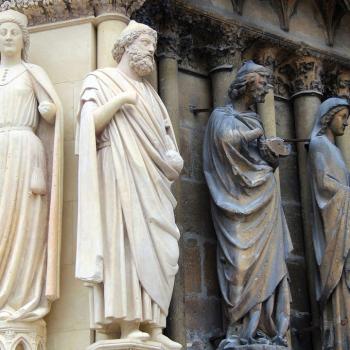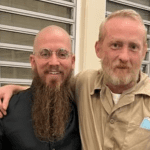The Fourth Sunday After Pentecost – June 16, 2024
I Samuel 15:34-16:13
Psalm 20
II Corinthians 5:6-10, 16-17
Mark 4:26-34
We walk by faith and not by sight. While this world is “real” and fraught with danger as well as filled with wonder, there is a movement beneath the surface and in each moment of experience that reveals a deeper dimension, the presence of God and the moral and spiritual arcs of history. Faith is a matter of perception and trust taking us beyond the obvious. Faith is a matter of vision, of cleansing the doors of perception to see the infinity of things and the “sacrament of the present moment.” (see William Blake and Pierre de Caussade) The eyes of faith see more than meets than eye. They open us to deeper levels of reality. When we are faithful, we begin to see the world from God’s perspective and not just our own. We see the long haul, the moral and spiritual arc of the universe, as well as the present moment’s challenge. We see the Christ within, waiting to flourish, where others see “nuisances and nobodies.”(John Dominic Crossan)
Today’s readings proclaim that God looks beyond appearances to see the human heart. God goes beyond the superficial to see beauty hidden in geodes and wonders in a small seed. A child’s lunch can feed a multitude. A persecutor can become the leading voice for a global faith. A There is more to be found in every person and situation, and congregation. No moment tells the whole story or is final; there is always the possibility of new creation. Amid the concrete limitations of life, there is always more than meets the eye.
The passage from I Samuel describes the anointing of David as king. Sent to Bethlehem to seek a successor to Saul, with whom God has lost confidence, Samuel initially identifies the obvious candidates, based on age, skill, and stature. Samuel sees superficially, identifying age, brawn, and experience with worthiness for leadership. In contrast to his initial evaluation, God tells him that leadership is not a matter of external appearance or previous achievement and invites him to look more deeply at Jesse’s children until he finds an unlikely successor, the young, and scrawny by comparison, shepherd David.
The message is to pay attention to what lies beneath the surfaces of life and to look beyond the obvious and discover God in the unexpected, humble, and non-assuming realities of life. Divine revelation doesn’t always conform to our expectations or cultural norms; God is profoundly iconoclastic, revealing God’s vision in unlikely situations and persons. As Mary Oliver says, “Pay attention. Be astonished. Tell about it.” What divine message is hidden in the humble? What way when we see no way will emerge when we train our senses to see more deeply?
Psalm 20 speaks of God’s sustaining and protecting presence in a time of trouble. Call upon God and God will provide the resources you need to flourish. With threat all around, God is faithful and will deliver his people. We need God’s loving care to find wholeness and victory amid the challenges of life. We are not self-sufficient but need a power and wisdom greater than our own. Times of trouble remind us that apart from God’s grace, we are lost. God’s graceful support encourages, rather than denies, creative action. Responding to God’s call and confident in God’s grace, we can boldly act to change the world. The most difficult times – times we wish never happened – may become the catalysts for growth if we look beneath the surface to discern God’s movement within events God has not chosen or willed. “In all things God works for good,” and despite appearances, including God’s apparent absence, our companioning and partnering God is subtly at work, inviting us forward lovingly and not compelling coercively.
Psalm 20 speaks of the power of naming. Calling on God’s name, speaking God’s name, invoking Jesus, can banish our fears and bring new energies to our lives. When in trouble, take time to invoke Jesus’ name. It has the power to calm our spirit, widen our perspective, give us new courage, and elicit new energies. As the hymn says, “take the name of Jesus with you.”
The words from II Corinthians invite us to a deeper perception of life. We walk by faith, our sharing in God’s perception of the world, and not by sight, limited by the world’s judgments. God wants us to be imaginative and creative. As part a holy imagination, sight limits us to one-dimensional realism and imprisons us in the past, our own and others’ sinful behaviors. Faith opens us to a deeper dimension of life, and to graceful levels of reality that allow us to dream and embody our dreams to change the world. When we call on God, answers come – whether in finding your congregation’s vision or a path forward for healing the soul of the nation? We can only pray that God is at work in this desperate national time, when persons have lost their reason, Christians lead the parade of hate mongering, and the public bows down to a would be dictator, whose greatest support is in the Christian community. How can we be Christian in such a time without tearing the fabric of relationships?
We are challenged to go beyond appearances and to see the divine presence in unlikely places, including our companions at church and ourselves. We are invited to see the movements of God’s grace – the power of God’s salvation – in our own lives and in the people of around us, seeing them and us from a divine rather than human point of view. Just as the humiliation of the cross is the source of our salvation, our own mortality and fallibility – our clay jars – reveal a greater treasure than we can imagine. Being in Christ opens us to unimaginable possibilities. In Christ, we are a new creation, and liberated from the past we can do great things as God’s companions in healing the world.
The insightful preacher invites us to ponder what it means to be a “new creation.” Where do we need to open to God’s novelty? Where do we need to liberate ourselves from the “old” to experience God’s “new” heaven and earth? Can we be new creations as a congregation and in performing our civic duties? What would it be like to do a “new thing” for God and the world?
The parables from Mark 4 describe the surprising growth of God’s realm. Small is not only beautiful; it can also be powerful and life-transforming. The smallest of seeds can become a great plant giving shelter to birds. The broadcast of seeds, falling everywhere, is the precursor to a great harvest. This is a wonderful opportunity to remind congregants of the importance of nurturing children and for members of small churches to know that small is beautiful and that God can do great things from small seeds.
Growth may even occur when it is least expected and against all odds. Where might we scatter seeds of hope and hospitality? Where we might bring great changes from small beginnings? Jewish wisdom says that if you save a soul, it’s as if you’ve saved the world. I believe that even more significant is the possibility that the world is saved one action at a time. “Pay attention” to where you can be a voice for God and a healing presence. “Be astonished,” at the holy ground upon which you stand and the angelic in your midst. “Tell about it,” by words or deeds let the light of God shine in you one moment at a time.
Today’s readings inspire us to see the divine energy and insight present in unexpected places and that includes ourselves and our congregations. We look beyond the obvious to discover God moving in unlikely persons and situations. In all things God works for good and though the seeds God’s realm often appear to be precarious and unimportant – infinitesimal – a great harvest and great possibilities are on the horizon for those who see from a God’s eye view, the eyes of faith, and bring forth great things from small beginnings.
+++
Bruce Epperly is a pastor, professor, and author of over eighty books, “Jesus: Mystic, Healer, and Prophet,” “Process and Politics,” Spirituality, Simplicity, and Service: The Timeless Wisdom of Francis, Clare, and Bonaventure,” and “The Elephant is Running: Process and Open and Relational Theology and Religious Pluralism.” He is the author of the upcoming “The God of Tomorrow: Whitehead and Teilhard on Metaphysics, Mysticism, and Mission” and “Head, Heart, and Hands: An Introduction to St. Bonaventure.”













